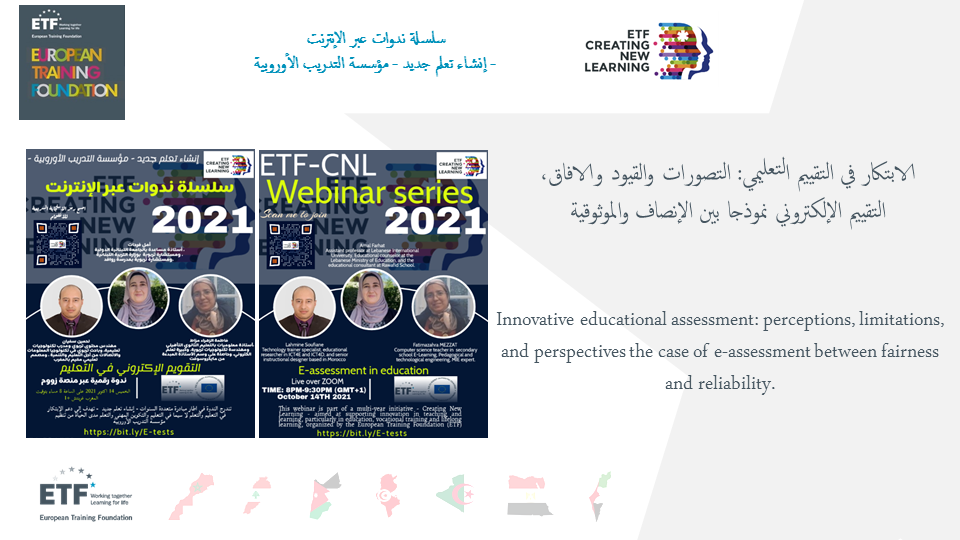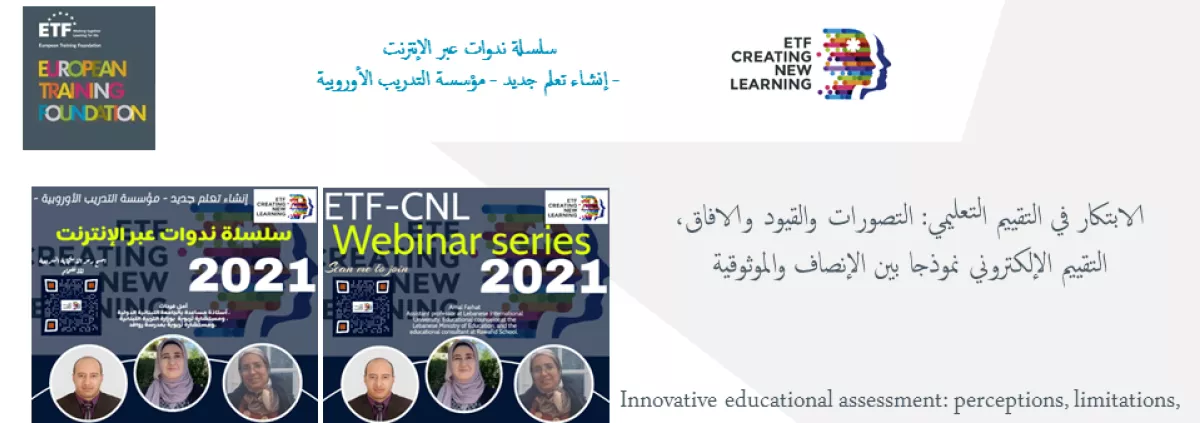 This is a post-release following the results of the webinar Innovative educational assessment: perceptions, limitations, and perspectives the case of e-assessment between fairness and reliability. conducted by the Community of Innovative Educators on October 14, 2021.
This is a post-release following the results of the webinar Innovative educational assessment: perceptions, limitations, and perspectives the case of e-assessment between fairness and reliability. conducted by the Community of Innovative Educators on October 14, 2021.
The webinar was animated by 3 international experts (2 Moroccans and 1 Lebanese keynote speaker)
 Dr. Amal Farhat is an assistant professor at Lebanese International University, an educational counselor at the Lebanese Ministry of Education and Higher Education, and an educational consultant at Rawafid School.
Dr. Amal Farhat is an assistant professor at Lebanese International University, an educational counselor at the Lebanese Ministry of Education and Higher Education, and an educational consultant at Rawafid School.
She gave a talk regarding Engaging Students in Collaborative Online Tasks and Authentically Assessing Their Learning – Practical Applications, One of the challenges in online teaching is to engage students in authentic tasks such as project work where they have to meet, cooperate and work efficiently. In her talk, Dr. Farhat presents some tasks her students engaged in during online learning where they often had to work in teams on projects to achieve a common goal. Moreover, she presented some practical tips that she had tried to assist her students during their assignments so that they stayed on task and accomplished what was required of them. The presentation ended with key takeaways: online assessment tasks should be authentic requiring students to interact and come up with unique products that cannot be found in books or internet searches, instructions for how to conduct the tasks should be clear, concise and thorough, and work students’ work should be monitored where reflection and feedback are integrated into the process.
 Prof Fatimazahra MEZZAT is a computer science teacher in middle school, E-Learning expert, Instructional Designer, and technologist as well as MIE expert.
Prof Fatimazahra MEZZAT is a computer science teacher in middle school, E-Learning expert, Instructional Designer, and technologist as well as MIE expert.
Unfortunately, Prof Fatimazahra MEZZAT was not able to join because of technical reasons but her presentation is provided below, Her presentation was about Innovative educational assessment and evaluation, the case of Electronic evaluation between application and challenges. The talk targeted mainly distant assessment and how to scaffold effective remote evaluations, the presentation is giving some applications and limitations of such E-tests modality, in addition, it contains a brief tour related to some E-assessment tools with some pros and cons...
 Mr. Lahmine Soufiane is Technology trainer specialist, an educational researcher in ICT4E and ICT4D, and senior instructional designer based in Morocco. Within ETF, he is the educational international expert in charge of international teaching and learning: cat.II: countries of the south and East Mediterranean (Algeria, Egypt, Palestine, Morocco, Lebanon, Jordan, Tunisia) within ETF-CNL project.
Mr. Lahmine Soufiane is Technology trainer specialist, an educational researcher in ICT4E and ICT4D, and senior instructional designer based in Morocco. Within ETF, he is the educational international expert in charge of international teaching and learning: cat.II: countries of the south and East Mediterranean (Algeria, Egypt, Palestine, Morocco, Lebanon, Jordan, Tunisia) within ETF-CNL project.
Soufiane's talk was about Innovative educational assessment: perceptions, limitations, and perspectives the case of e-assessment between fairness and reliability. After introducing the Community of Innovative Educators that is part of the ETF’s Creating New Learning initiative and inviting participants to join and contribute. Mr Lahmine gave practical tips and hints on how to innovate in T&L using e-assessment, moving to explain how to choose the right type of online assessment solution based on blooms taxonomy (Digital version vs Classical) and the importance of matching assessment with an adequate level of learning objectives -Learners should understand the principle behind the evaluation, e.g. understand what cognitive level(s) will be measured (e.g. recall, understand, analyse, evaluate)- Measures should be precise but take into account certitudes (confidence level) of the learner, Coherence of response items with the overall testing score. During open questions Mr. Lahmine did answer on how to deal with cheat and reduce test wiseness student in addition how to monitor and proctor your exams for better results, to answer the big question of the webinar is e-assessment fair and reliable? the debate did raise some indexes to achieve such challenge, it was about Discrimination, Difficulty, Reliability, and effective distractors indexes... He concluded his talk with some quality e-assessment recommendations such as the 20 rules for creating a quality MCQ test issued from
D. Leclercq (1986). La conception des QCM. Bruxelles : Ed Labor. Chap 3 .Règles de Rédaction des QCM p. 85-107
Last but not least it was about practical assessment digital tools that every teacher could use in the T&L process.
Session recording is available hereafter and we are so sorry for the disturbance caused by technology that day Mr. Lahmine was experiencing serious ZOOM application freezing and prof Mezzat didn't succeed to join due to some technical issues...
We thank ETF for this initiative especially Julian Stanley for keeping the Webinar smooth even after technical disturbance, we also thank our keynote speakers for accepting the invitation to share with Community of Innovative Educators their experiences, practices and ideas...
Stay tuned for upcoming activities on open space, the first step for every teacher towards innovation.

Indeed, we have to follow new 21st century educational trends such as virtual and open universities with fully online degrees and self-paced learning paths... https://www.openuniversity.edu https://www.open.edu.au/ https://iou.edu.gm/ https://www.open.ac.uk/